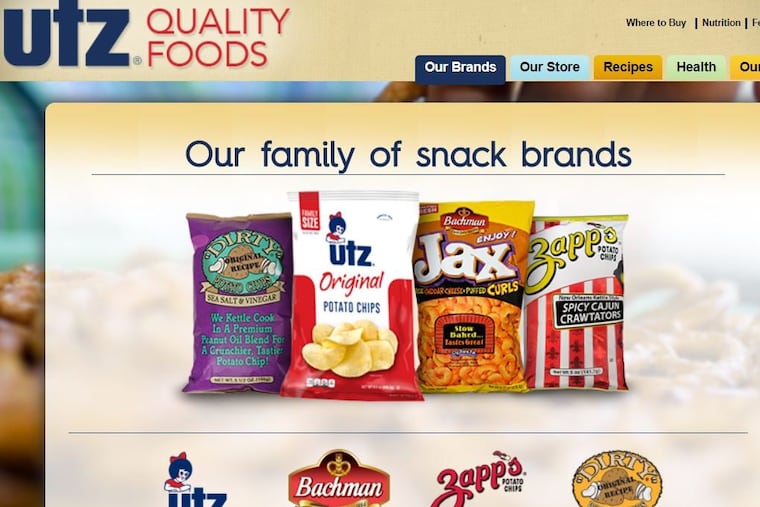Utz's new bosses speed growth with debt, mergers, cuts
The snack-foods company told investors that it plans to borrow $660 million, including $300 million to buy out its private-equity investors and $165 million to acquire publicly traded Inventure Foods Inc., as well as for refinancing and other expenses.

Utz Quality Foods LLC is accelerating its push to become one of the giants in the potato chips-pretzels-crackers business, where national rivals such as Pepsico's Frito-Lay and Snyder's-Lance have been buying up local plants, consolidating brands, and streamlining distribution to cut labor and boost profits.
Privately held Utz, based in Hanover, Pa., is controlled by members of the Rice family. Last week, the company told investors that it plans to borrow $660 million, including $300 million to buy out its private-equity investors and $165 million to acquire publicly traded salty-snacks maker Inventure Foods Inc., as well as for refinancing and other expenses, according to a report by analyst Bea Chiem at S&P Global Ratings, the credit-rating agency.
Utz calls itself "the largest privately held and family-managed salty-snack company in the U.S.," with brands including Zapp's, Bachman, Dirty, Golden Flake, Good Health, Jax, Snikiddy, Wachusett and Zapp's, made at plants in Alabama, Colorado, Louisiana and Massachusetts, along with Pennsylvania.
The buyback and refinancing comes just over a year after Utz agreed to sell a minority share to Metropoulous & Co., owner of Hostess, Pabst Blue Ribbon, Bumble Bee, and dozens of other brands, after Metropoulous invested more than $135 million in Utz acquisitions.
At that time, Utz CEO Dylan Lissette, whose wife is a Rice, told me that the company planned to double sales, from $800 million to $1.6 billion, with Metropoulous' help. Lissette and other senior Utz officials, and people at Metropolous, did not return calls asking why they are ending the relationship, or how much Metropolous made on the deal.
With debt totaling just over $700 million after it completes its planned borrowing, about five times the company's yearly profits (before interest, taxes, depreciation and amortization), Utz can "continue to generate stable earnings," boost profitability "through cost cuts," switch to a direct-store delivery model to handle higher-volume sales to bigger stores, and buy more small snack makers over the next year, S&P added in a report to clients.
Along with the emphasis on mergers and cost-cutting, Utz has beefed up its management staff. Earlier this year, food-industry publications reported that it appointed former McKinsey & Co. consultant and private-equity executive Tom Flocco as its new president and chief operating officer. Also new are chief customer officer Mark Schreiber, a former top executive at Connecticut-based Pepperidge Farm, and chief financial officer Jay Thompson, formerly at Armstrong Flooring in Lancaster.
Separately, Utz agreed to buy Arizona-based Inventure, which trades on Nasdaq as SNAK, for $4 a share, or $165 million in cash and debt assumption. Inventure makes and markets products under the registered trademarks Bob's Texas Style, Boulder Canyon, Jamba, Nathan's Famous, Poore Brothers, Rader Farms, Seattle's Best, Sin in a Tin, Tato Skins, TGI Fridays, Vidalia and Willamette Valley Fruit. The company has plants in Arizona, Indiana, Washington, Oregon, and Georgia.
In connection with Utz's borrowing plans, S&P gave the company a junk-bond B corporate-credit rating on its $535 million first-lien term loan, and a more-speculative CCC+ rating on a $125 million second-lien loan. That means S&P considers Utz less likely to pay back its lenders than A-rated companies, and will have to pay higher interest to borrow money.